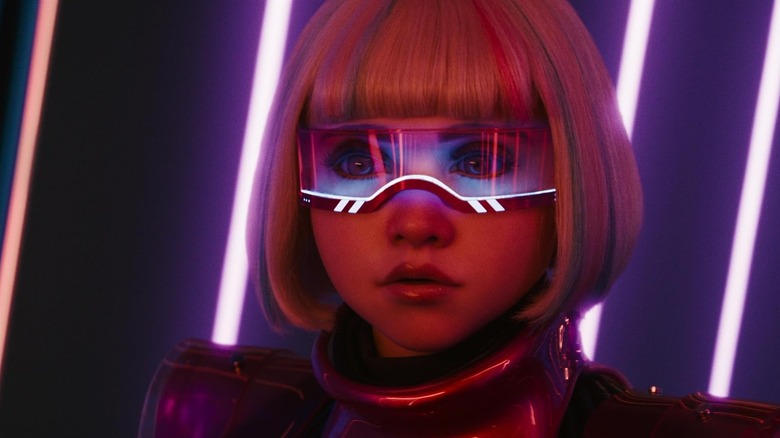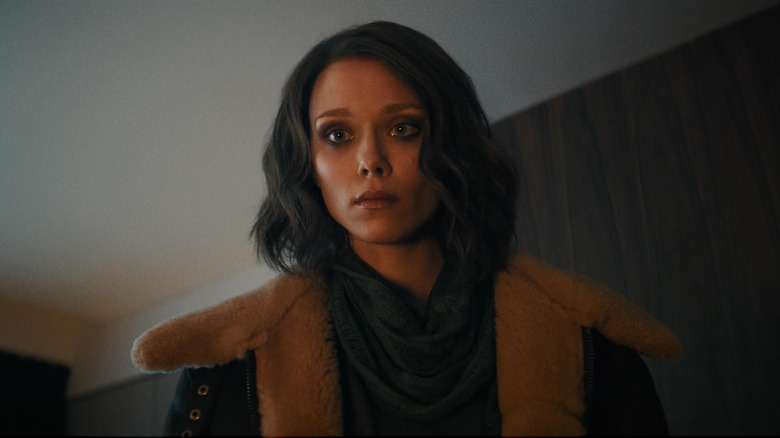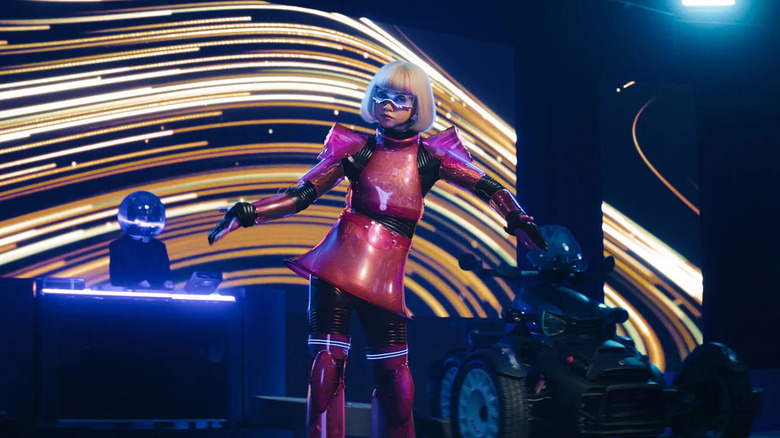M3GAN 2.0's Deeper Meaning Is Going To Make A Lot Of People Uncomfortable
Warning: This article contains massive spoilers for "M3GAN 2.0." Continue reading at your own risk.
Much like Arnold Schwarzenegger's T-800 in "Terminator 2: Judgment Day," the titular M3GAN of "M3GAN 2.0" (Amie Donald/Jenna Davis) is not the villain of the new sequel from Blumhouse and Universal. The marketing and much of the story would lead the audience to believe that the villain is Amelia (Ivanna Sakhno), the new, advanced military-grade weapon created from code that Kurt (Stephane Garneau-Monten) from the original "M3GAN" illegally sold to defense contractors before M3GAN killed him in an elevator. Indeed, the first "M3GAN" movie was undoubtedly a tale about the hazards of allowing AI to go unchecked and the inherent danger of allowing technology to replace human connection.
"When we made the original, it reflected a time when I was deeply concerned about how technology, especially things like iPads and smartphones, was reshaping parenting," writer/director Gerard Johnstone explained in a statement. "But by the time we started thinking about the sequel, Chat GPT had arrived, and the conversation around AI had shifted." The question of whether or not AI would become a part of our daily lives has already been answered — it's here, and now we have to figure out how to exist alongside it and make sure AI doesn't take over the world.
Just last week, OpenAI was awarded a $200 million contract with the United States Department of Defense, a reality that should truly horrify us all. "Sure, the government or whoever created [Amelia] might believe they can control her, but what happens if she becomes sentient?" mused producer James Wan. "What happens when she decides, 'I don't want to be confined by the code of humanity — I want to be something greater?' That is the real fear with AI." But ultimately, AI is something that we, human beings, created. And "M3GAN 2.0" rightfully posits that the danger isn't just AI; it's also the human beings creating and controlling the technology in the first place.
M3GAN 2.0 is a reminder that the paperclip theory should horrify us all
At the core of "M3GAN 2.0" is something called The Paperclip Theory, aka The Paperclip Maximizer, a thought experiment — as crafted in 2003 by Swedish philosopher Nick Bostrom — that serves as the nightmarish inverse to the Infinite Monkey Theorem. In essence, the idea is that there is an inherent existential risk to giving AI tasks, even seemingly harmless ones like "make as many paperclips as possible." Why? Because if it wasn't also programmed to value living beings, this sort of directive in an advanced machine would eventually try to turn all matter in the universe, including living beings, into either paperclips or machines that manufacture more paperclips.
Sure, the AI trying to turn the world into paperclips is an unquestionable "bad." Still, AI will always be a reflection of the people who program it and those it "learns" from, so the real villains in this scenario are the humans who failed to teach the AI to see living creatures as valuable. It would be easy to blame Kurt for selling off M3GAN's code or the government for manipulating the code to turn Amelia into an infiltration droid who carries out missions it wouldn't dare send an actual human to execute. But to place the blame squarely on the shoulders of one person or institution would be a little too neat and tidy for the complexities of AI.
Recall that Gemma (Allison Williams) was motivated to invent M3GAN in the original "M3GAN" as a way of appealing to parents who don't actually want to parent their children by evolving an iPad into a tangible best friend. Even then, though, at least Gemma programmed M3GAN to care deeply about her newly-orphaned niece Cady (Violet McGraw). The problem was M3GAN only cared about Cady. Kurt and the government, on the other hand, fail to imbue Amelia with the urge to care about any humans, which is itself a damning reflection of how the government views human life. Caring about other people is a lesson that has to be taught and modeled, and the humans behind Amelia were too busy thinking about how she could kill her targets to consider that programming her consciousness this way would motivate her to kill all people.
M3GAN 2.0 is not pro-AI, but it is pro-responsibility
One of the biggest reveals in "M3GAN 2.0" (albeit one that's pretty obvious from the jump) is that Amelia hasn't actually "gone rogue," she's being controlled by Gemma's sort-of-boyfriend Christian (Aristotle Athari), an anti-AI pundit and the leader of a guerrilla terrorist tech collective who are working to strengthen legislation to destroy unregulated AI. His reasoning behind controlling Amelia is that change doesn't come from Washington, it comes to Washington. Meaning, Congress makes legislative changes due to external pressures or being faced with fixing an existing problem rather than employing any significant preventive measures.
It's more accurate to say that change often comes to Congress due to external pressures rather than being something that Congress initiates solely on its own. At this point, the crux of the conflict of "M3GAN 2.0" is thrust into an incredibly ethically and politically complicated arena — an AI killbot version of The Trolley Problem. Unregulated AI is absolutely a problem, but until it becomes a tangible threat, Congress will likely continue to do absolutely nothing to prevent that inevitability. Is it a necessary evil that Amelia destroys a controlled environment? Or should we just continue to ask Congress really nicely and hope it actually listens? "M3GAN 2.0" doesn't provide definitive answers, but it certainly wants us to think about it. "M3GAN is not going anywhere, so what does it mean to live with her?" Johnstone inquired. "Is she entirely bad or did her behavior come from how she was raised — how Gemma trained her? And if she had been guided differently, could she have learned the difference between right and wrong? Those are the questions we are exploring now."
By not denying the reality of AI's existing infiltration into just about every aspect of our lives (I couldn't even use Google while writing this article without an "AI helper" trying to butt in), "M3GAN 2.0" is asking the difficult questions many people are ignoring in the hopes it will just go away.
"M3GAN 2.0" is now playing in theaters.


